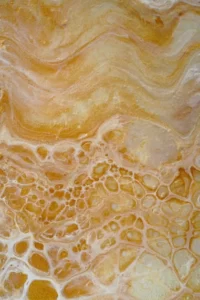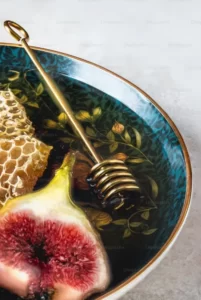Table of Contents
Eczema is a common skin condition that affects millions of people worldwide. It is characterized by dry, itchy, and inflamed skin, which can be both uncomfortable and unsightly. While there are many treatment options available for eczema, some individuals prefer to explore natural remedies that are gentle on the skin.
One such natural remedy is manuka honey. Manuka honey is a type of honey that is produced in New Zealand from the nectar of the manuka tree. It has been used for centuries for its healing properties and is known for its antibacterial, anti-inflammatory, and moisturizing effects. In recent years, manuka honey has gained popularity as a natural treatment for various skin conditions, including eczema.
How Does Manuka Honey Work for Eczema?
Manuka honey contains several bioactive compounds that contribute to its healing properties. One of the key compounds is methylglyoxal (MGO), which is responsible for the honey’s antimicrobial activity. MGO helps to inhibit the growth of bacteria and other microorganisms on the skin, reducing the risk of infection and promoting healing.
In addition to its antimicrobial properties, manuka honey also has anti-inflammatory effects. It helps to reduce inflammation, calm irritated skin, and relieve itching. The honey’s high sugar content creates a protective barrier on the skin, preventing moisture loss and promoting hydration.
Furthermore, manuka honey is rich in antioxidants, which help to neutralize free radicals and protect the skin from oxidative damage. This can help to reduce inflammation and promote the healing of damaged skin.
How to Use Manuka Honey for Eczema
Manuka honey can be used topically to soothe and heal eczema-affected skin. Here are a few ways you can incorporate manuka honey into your skincare routine:
1. Manuka Honey Face and Body Wash
You can use manuka honey as a face and body wash to cleanse and moisturize your skin. Simply apply a small amount of manuka honey to damp skin and gently massage it in. Rinse thoroughly with warm water. This will help to remove impurities from the skin while providing hydration and soothing relief.
2. Manuka Honey Skin Cream
Apply a manuka honey skin cream to the affected areas of your skin. Look for a cream that contains a high concentration of manuka honey and other natural ingredients that promote skin health. Massage the cream into your skin until it is fully absorbed. This will help to moisturize your skin and provide relief from itching and inflammation.
3. Manuka Honey Conditioner
If you have eczema on your scalp, you can use a manuka honey conditioner to soothe and hydrate your scalp. Apply the conditioner to your hair and scalp, leave it on for a few minutes, and then rinse thoroughly. This will help to moisturize your scalp and reduce flakiness and itching.
4. Manuka Honey Shampoo
You can also use a manuka honey shampoo to cleanse and moisturize your hair and scalp. Look for a shampoo that contains manuka honey and other natural ingredients that promote scalp health. Massage the shampoo into your scalp and hair, leave it on for a few minutes, and then rinse thoroughly.
5. Manuka Honey Wraps
For severe eczema flare-ups, you can create a manuka honey wrap to provide intense hydration and healing. Apply a thick layer of manuka honey to the affected areas of your skin, cover it with a clean bandage or gauze, and leave it on for a few hours or overnight. This will help to lock in moisture and promote healing.
Precautions and Considerations
While manuka honey is generally safe to use, it is important to keep a few things in mind:
- Patch Test: Before applying manuka honey to a larger area of your skin, perform a patch test on a small area to check for any allergic reactions or skin sensitivities.
- Quality: Make sure to choose a high-quality manuka honey that is genuine and certified. Look for a UMF (Unique Manuka Factor) rating on the packaging, which indicates the honey’s antibacterial potency.
- Avoiding Eye Area: Avoid applying manuka honey near your eyes, as it can cause irritation.
- Consult a Dermatologist: If your eczema symptoms persist or worsen despite using manuka honey, it is important to consult a dermatologist for further evaluation and treatment.
Conclusion
Manuka honey is a natural remedy that can help soothe and heal eczema-affected skin. Its antimicrobial, anti-inflammatory, and moisturizing properties make it an effective treatment option for individuals seeking a gentle and natural alternative. Incorporating manuka honey into your skincare routine can provide relief from itching, inflammation, and dryness, promoting healthier and more comfortable skin. Remember to choose a high-quality manuka honey and consult a dermatologist if needed.



